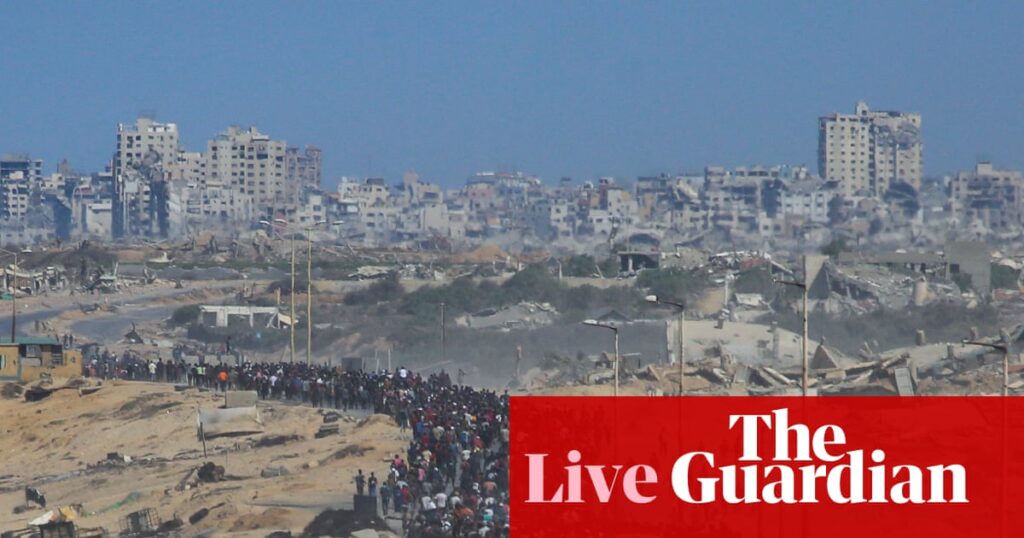Hamas official thanks Trump for peace deal but says Blair not welcome
Former British prime minister Tony Blair would not be welcome in any post-war role for Gaza, a senior Hamas official said, while praising Donald Trump in securing a peace deal.
Speaking to Sky News, Dr Basem Naim said a ceasefire would not have been possible without Trump but said the US president must continue to apply pressure to Israel to ensure the agreement is not violated.
He said:
Without the personal interference of president Trump in this case, I don’t think that it would have happened to have reached the end of the war.
Therefore, yes, we thank president Trump and his personal efforts to interfere and to pressure Netanyahu to bring an end to this massacre and slaughtering.
He added that Hamas would be willing to step aside for a Palestinian body to govern a post-war Gaza, but that they would remain “on the ground”.
He commented:
We believe and we hope that president Trump will continue to interfere personally and to exercise the maximum pressure on Netanyahu to fulfil the obligation.
First, as according to the deal, and second, according to the international law as an occupying power, because I think without this, without this personal interference from President Trump, this will not happen.
We have already seen Netanyahu speaking to the media, threatening to go to war again if this doesn’t happen, if that doesn’t happen.
However, he criticised plans for Blair to play any role in the future of Gaza.
Naim added:
When it comes to Tony Blair, unfortunately, we Palestinians, Arabs and Muslims and maybe others around the world have bad memories of him.
We can still remember his role in killing, causing thousands or millions of deaths to innocent civilians in Afghanistan and Iraq. We can still remember him very well after destroying Iraq and Afghanistan.
Key events
Hostage and prisoner release will be a huge challenge, says Red Cross
In an interview with the Associated Press, the International Committee of the Red Cross has warned that the expected hostage and prisoner release will be more challenging than previous ones given the scale and speed of the operation.
Christian Cardon, chief spokesman for the ICRC, said on Friday that while the group is expected to play a role as hostages are released from Gaza and Palestinian prisoners from Israel, it has not been given details in terms of when, how or where the releases would occur.
“Our colleagues are preparing themselves for all possible scenarios,” said Cardon.
He added that the terms of the deal, which call for the hostages to be released from Gaza within 72 hours, was an “extremely” tight time frame.
The ICRC was involved in prisoner and hostage releases in the two previous ceasefires during the war.
Three British surgeons have told Sky News they were denied entry to Gaza despite the announcement of the ceasefire coming into effect on Friday.
Dr Victoria Rose, Dr Alan Graeme Groom and Dr Khaled Dawes – who have all travelled to Gaza multiple times since October 2023 – were scheduled to enter Gaza on Sunday to perform reconstructive and general surgeries at the Nasser hospital complex, where thousands of injured civilians remain without access to essential care. Dr Rose told Sky News:
Blocking medical teams at this stage – after a ceasefire – is indefensible. Every delay costs lives. This decision violates basic humanitarian principles and the right to medical access.
Trump plans summit on Gaza during Egypt visit next week
Donald Trump plans to convene world leaders for a summit on Gaza during his visit to Egypt next week, Axios is reporting, citing four sources with knowledge of the matter.
Among those expected to participate are representatives from Germany, France, the United Kingdom, Italy, Qatar, the United Arab Emirates, Jordan, Turkey, Saudi Arabia, Pakistan and Indonesia. According to a US official, Israeli prime minister Benjamin Netanyahu will not be present.
The timing of the summit is unclear. According to Axios’s sources it will likely take place in Sharm el-Sheikh on Tuesday morning, but it could be moved to Monday.
Trump is expected to arrive in Israel on Monday morning local time, give a speech in the Knesset, and meet hostage families. In the afternoon, he will travel to Egypt to meet Egyptian president Abdul Fattah al-Sisi and participate in a signing ceremony along with with the other guarantors of the Gaza peace deal: Egypt, Qatar and Turkey.
The UN children’s agency has evacuated two of 18 newborns from a North Gaza hospital to be reunited with their parents further south, it said on Friday.
Its attempt to move two of the babies was suspended on Thursday amid an ongoing Israeli military assault on the city, Unicef said, but the children have since been reunited with their parents.
Israeli troops began pulling back from some parts of Gaza on Friday as a ceasefire took effect.
“We had 18 babies in incubators at the beginning of week. Two got moved yesterday,” Unicef spokesperson Ricardo Pires told a Geneva press briefing, saying the others are waiting in incubators for transfer.
“I hope this is just an example of what will come after the ceasefire is fully implemented,” he said.
Israel’s Cogat, the arm of the Israeli military that oversees Gaza aid flows, confirmed that the two babies were transferred late on Thursday in coordination with Unicef.
A ceasefire agreement between Israel and Hamas for the Gaza Strip has come into effect. The deal is hoped to bring about a pause to Israeli bombardment, a break in the siege and an exchange of captives.
Here are the key people linked to the deal:
Hamas official thanks Trump for peace deal but says Blair not welcome
Former British prime minister Tony Blair would not be welcome in any post-war role for Gaza, a senior Hamas official said, while praising Donald Trump in securing a peace deal.
Speaking to Sky News, Dr Basem Naim said a ceasefire would not have been possible without Trump but said the US president must continue to apply pressure to Israel to ensure the agreement is not violated.
He said:
Without the personal interference of president Trump in this case, I don’t think that it would have happened to have reached the end of the war.
Therefore, yes, we thank president Trump and his personal efforts to interfere and to pressure Netanyahu to bring an end to this massacre and slaughtering.
He added that Hamas would be willing to step aside for a Palestinian body to govern a post-war Gaza, but that they would remain “on the ground”.
He commented:
We believe and we hope that president Trump will continue to interfere personally and to exercise the maximum pressure on Netanyahu to fulfil the obligation.
First, as according to the deal, and second, according to the international law as an occupying power, because I think without this, without this personal interference from President Trump, this will not happen.
We have already seen Netanyahu speaking to the media, threatening to go to war again if this doesn’t happen, if that doesn’t happen.
However, he criticised plans for Blair to play any role in the future of Gaza.
Naim added:
When it comes to Tony Blair, unfortunately, we Palestinians, Arabs and Muslims and maybe others around the world have bad memories of him.
We can still remember his role in killing, causing thousands or millions of deaths to innocent civilians in Afghanistan and Iraq. We can still remember him very well after destroying Iraq and Afghanistan.
A list published on Friday by Israel of Palestinian prisoners to be released as part of the deal does not include high-profile prisoner Marwan Barghouti, the most popular Palestinian leader and a potentially unifying figure.
Israel views Barghouti and some others as terrorist masterminds who murdered Israeli civilians and has refused to release them in past exchanges.
British prime minister Keir Starmer has agreed to back “substantive humanitarian aid packages” during the ceasefire between Israel and Hamas, along with his E3 counterparts, they have revealed in a statement.
The UK, French and German leaders’ statement, after they spoke on Friday, reads: “We welcome the agreement on a ceasefire in the Middle East, the planned release of hostages, and the resumption of humanitarian aid to the civilian population of Gaza.
“We pay tribute to president Trump’s leadership on the issue, to the diplomatic efforts of the mediators, Egypt, Qatar and Turkey, and to the vital support from the wider region to secure the agreement.
“It is now of utmost importance that all parties implement their obligations in full and without delay.
“We stand ready to support further talks on the next stages of the plan and to contribute to it.
“As part of this effort, we agree that the UN security council should give its full backing to the plan and support its implementation.
“We commit to supporting substantive humanitarian aid packages through UN agencies to be delivered as soon as the ceasefire enters into effect.”

Jason Burke
Benjamin Netanyahu repeated his pledge to force Hamas to disarm on Friday in a defiant and combative speech, just an hour after a ceasefire began in Gaza.
In a televised address, Israel’s prime minister said he had resisted intense domestic and international pressure to achieve his aim of ensuring “the security of Israel”, lambasted his critics and reiterated a threat to return to war if necessary.
“Hamas agreed to the deal only when it felt the sword resting on its neck and it is still on its neck … Hamas will be disarmed and Gaza will be demilitarised … If this is achieved the easy way, so much the better. And if not, it will be achieved the hard way.,” Netanyahu said.
The deal signed early on Thursday and implemented on Friday will lead to Hamas releasing 20 living hostages within 72 hours, the withdrawal of Israeli forces from parts of Gaza, and freedom for about 2,000 Palestinian prisoners held in Israeli jails. Further steps are still unclear.
In his address, Netanyahu said that achieving security for Israel meant “breaking the Iranian axis, of which Hamas is a central component”, suggesting that he had achieved this over the 24 months of relentless conflict.
Analysts described the speech as “an election speech”.
Trucks loaded with food and fruit belonging to Palestinian merchants enter the Gaza Strip via Salahaddin Street, south of the Netzarim Corridor.
Thousands of officers are set to be deployed for US president Donald Trump’s visit to Israel on Monday, Israeli police said. Police staff will be stationed along key points of the president’s planned journey.
Trump is expected to be making a short visit to Israel on Monday, where is due to address its parliament, the Knesset. This would mark the first visit there by a US president in almost two decades.
He reportedly will not be stopping at Tel Aviv’s Hostage Square over security concerns. However, the president said he would “probably” be in the region when the remaining hostages in Gaza are released.
As part of preparation for Trump’s visit, Israeli police said it would have officers deployed all along the president’s planned route to ensure “public safety, order, and smooth traffic flow.”
As Israel prepares to welcome U.S. President Donald Trump on Monday, the Israel Police is finalizing Operation “Blue Shield 6.” Thousands of police and Border Police officers will be deployed along key routes to ensure public safety, order, and smooth traffic flow during the… pic.twitter.com/Xx6cDx6zBS
— Israel Police (@israelpolice) October 10, 2025
Israel releases list of detainees set to be released, which does not include Barghouti
Israel has released a list of the Palestinian detainees that it plans to release as part of the ceasefire and hostage release agreement made with Hamas.
According to Israeli media, of the 250 Palestinian prisoners, 15 will be released in East Jerusalem, 100 to the West Bank, and 135 will be deported.
The BBC reports that initially, when Hamas officials submitted a list of proposed prisoners to be released to mediators in Egypt, they called for the release of high-profile Palestinian political figures such as Marwan Barghouti.
The now 66-year-old Barghouti was jailed by an Israeli court in 2002 for his role in planning several killings during the second intifada. However, Netanyahu’s office confirmed it refuses to release Barghouti.
Barghouti, who is sometimes compared to Nelson Mandela by his supporters, is a senior figure in Mahmoud Abbas’s Fatah movement. He is seen as one of the few figures who could meaningfully reconcile rival Palestinian factions, and is hugely popular in both the West Bank and Gaza.
The IDF said today (10 October) that the ceasefire came into effect at midday. This means Hamas now has a 72-hour period to release all 48 remaining Israeli hostages from Gaza, of which 20 are still believed to be alive.

William Christou
Thousands of displaced Palestinians have begun to return home from southern Gaza after a ceasefire came into effect and Israeli troops withdrew to an agreed-upon redeployment line – the first time that fighting has stopped in the devastated territory since March.
The Israeli military said the ceasefire agreement, which was approved by the Israeli cabinet on Thursday night and begins the first phase of a US-drafted plan to end the war in Gaza, had been activated at noon local time (0900 GMT) on Friday.
Under the terms of the plan, Hamas is expected to release the 20 living Israeli hostages within 72 hours, after which Israel will release 250 Palestinians serving long terms in Israeli prisons, as well as 1,700 others detained in Gaza during the war.
The Israeli prime minister, Benjamin Netanyahu, claimed credit for the hostage release, saying in an address on Friday that the “security of Israel” was what dictated his actions in Gaza.
“I believed that if we applied heavy military pressure, combined with heavy diplomatic pressure, we would absolutely be able to return all of our hostages,” said Netanyahu, who also thanked the US president, Donald Trump, for his support to achieve the deal.
Avichay Adraee, an Israeli Arabic-language military spokesperson, said residents of Gaza could return north via specific routes, while warning them away from areas such as Beit Hanoun and the Rafah border crossing, where troops remained. Israeli bombing in Gaza had intensified on Friday morning up until the ceasefire began.

